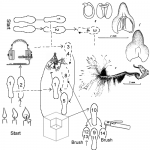 One of tenets of narrative logic — the logic used to make things true in our heads, that causes distress when it does not agree with observations — is that effort is rewarded, followed swiftly by a corollary that says greater effort is rewarded more than lesser effort. Of all the major disagreements with the nature of causality that we carry around in our heads, this one is the one that seems to cause the most misery. We desperately want there to be parity between effort spent and reward received, if not a slight tip of the balance in our favor.
One of tenets of narrative logic — the logic used to make things true in our heads, that causes distress when it does not agree with observations — is that effort is rewarded, followed swiftly by a corollary that says greater effort is rewarded more than lesser effort. Of all the major disagreements with the nature of causality that we carry around in our heads, this one is the one that seems to cause the most misery. We desperately want there to be parity between effort spent and reward received, if not a slight tip of the balance in our favor.
Physical causality isn’t like that. An action taken at the right place in the right time under the right circumstances has a result, and it might be a desired one, but it’s just the next step in a cascade. The result has multiple causes that we can classify in terms of necessary and/or sufficient with respect to the swirling horde of phenomena that we can isolate for scrutiny that was present before the result, but the result is merely the thing that comes after, the next event in the causal web-work. The result can be any size up to the total contained potential energy in the scenario — the Hamiltonian for the equation, if you will, plus or minus some Heisenbergian wiggle-room — though it is frequently much less. But the result doesn’t give a damn about the effort spent. The equation doesn’t have to balance across some arbitrary always-in-motion temporal before-and-after point.
Anyone can kick a loose stone and trigger an avalanche. Anyone can spend their lives trying to empty the ocean with a bucket.
In April of this year (2012, because the Internet is forever), Cristine H. Legare and André L. Souza of UT Austin published a study titled “Evaluating Ritual Efficacy: Evidence from the Supernatural” in Cognition. You should have a look at it, even if you’re not the sort of person who goes around skimming academic journal articles for fun. The bulk of it is readable by a lay-person, and it goes into a comfortable amount of detail on the sorts of things that make sense, in terms of narrative logic, trying to balance the effort versus reward equation in the absence of a physically causal schema. The tables and graphs are excellent for illustrating the principles.
A skeptic of the supernatural would be tempted to take a sniggering view, pointing at the rituals studied being what people attempt to effect change without a working grasp of physical causality, but there’s a reason that it’s published in a journal called Cognition. The human sense of fairness runs very deep. We sometimes deny ourselves the things we are owed because we don’t feel like we’ve earned them.
Rituals and similar little superstitious behaviors helps up restore the balance in terms of the narrative logic we’ve grown up with since we were children — that sacrifice and effort is rewarded on the scale of what was lost, that misfortune is similarly earned on the scale of conscious or unconscious infractions, and that anything unearned is a blessing or a curse that can be taken away at the whims of our supernatural betters.
We derive so much comfort from the satisfaction of narrative logic, from the stories we tell ourselves in our heads about what’s going on making a justified sense, that it can be, in some, a health- and relationship-ruining addiction. There is an actual dopamine release, an internal opiate reward, for the ah! moment of the story coming together, even though sometimes it’s clearly a false conclusion. But it is an addiction, and we must have it. We must have answers that make narrative sense.

